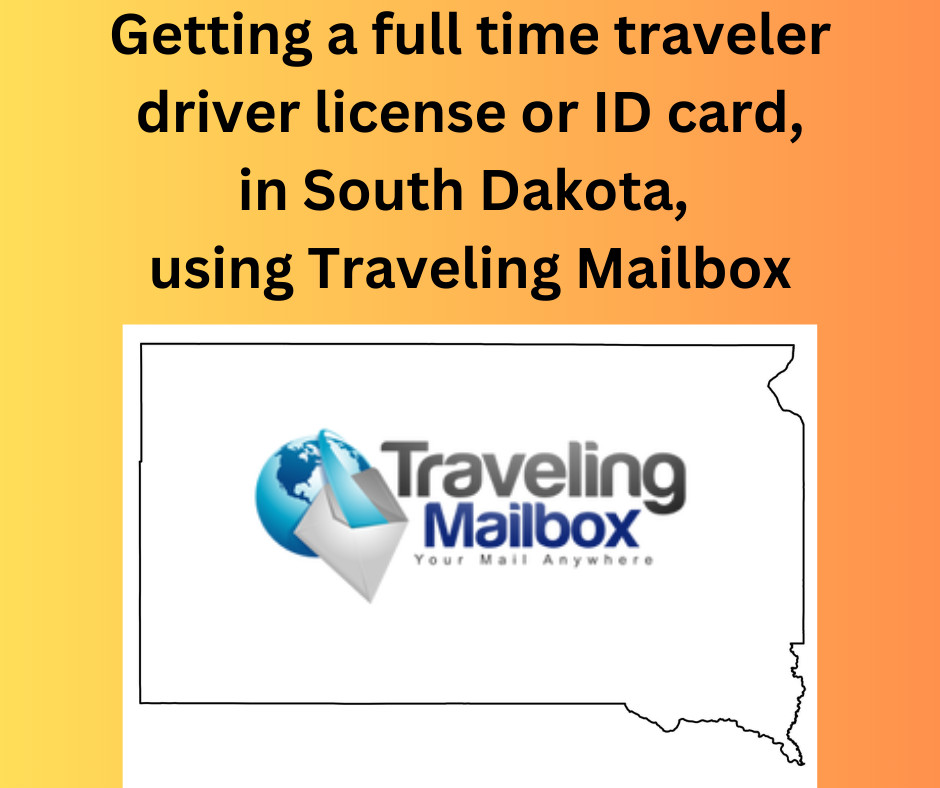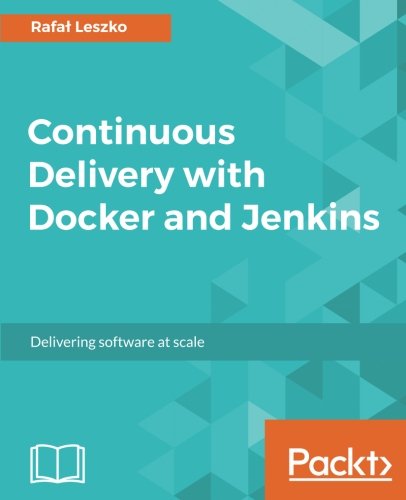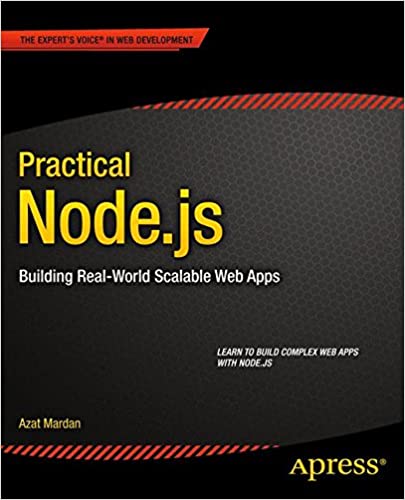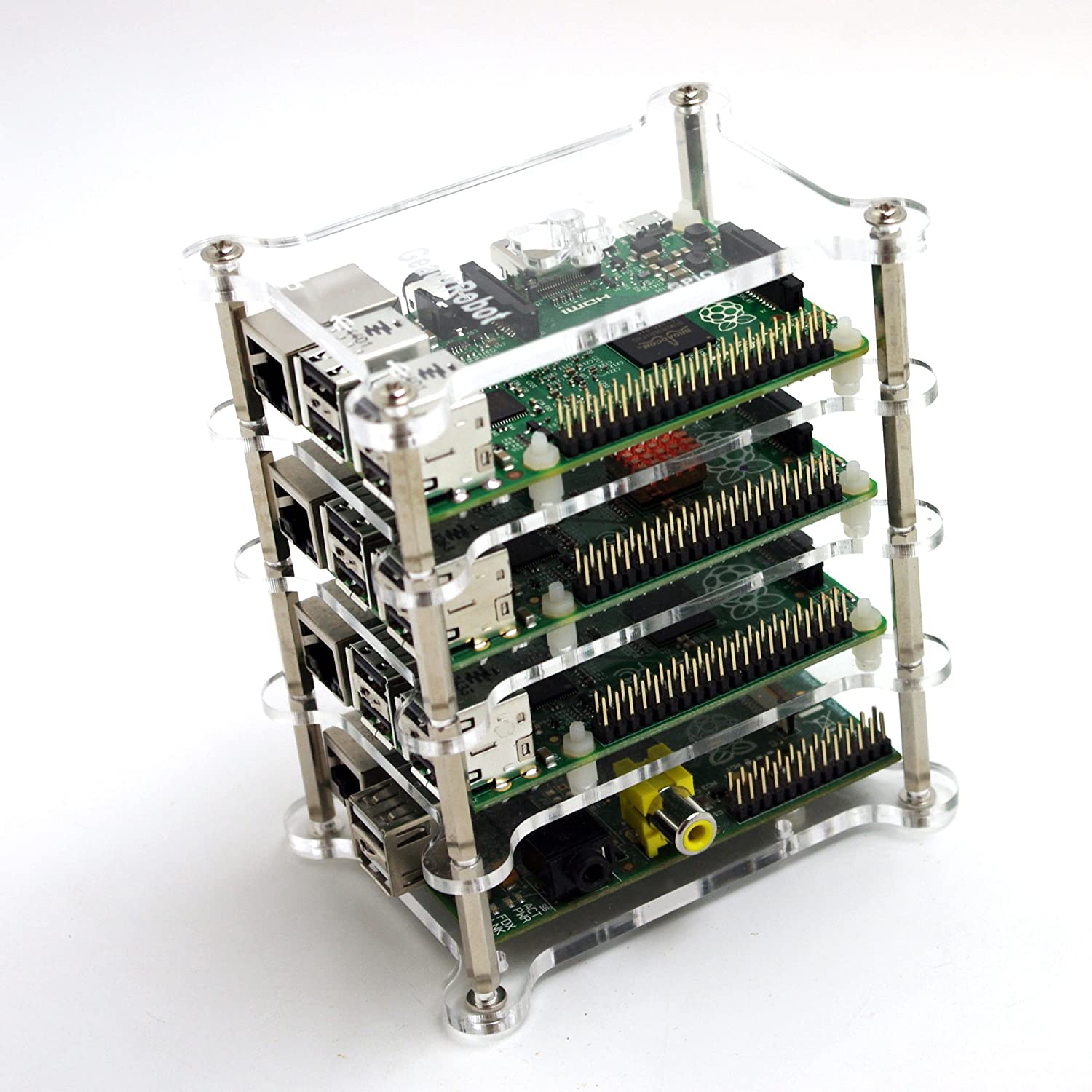; Date: Sat Oct 14 2023
Tags: Digital Nomad »»»»
South Dakota offers folks who are full time travelers and do not have a fixed residence, to get a drivers license or ID card. One option is using a Traveling Mailbox mail forwarding account as a residence address. While a prominent YouTube channel ran into trouble with using Traveling Mailbox for this purpose, I had success.

The full time travelers program in South Dakota is designed for people whose life is to travel full time. Such people probably do not have a home or apartment they are renting or owning. Isn't it silly to own/rent a home/apartment that one never even visits?
As discussed in How an American can prepare for life as a full-time traveler, inside or outside the USA , there are many people who choose a nomadic life. Some examples are traveling nurses, traveling salesmen, migrant laborers, digital nomads, travelers living in RVs full time, and others, who find it convenient or necessary to not have a fixed address. But, participating in normal financial matters requires having a mailing address which is recognized by tax authorities or financial institutions.
This means having an address which functions as a residence address, even though the person does not live at that location but is traveling here or there depending on their work/needs.
In the USA, three states have programs tailored for such people. Instead of requiring a fixed residence address, these states allow such people to use a mail forwarding address as their residence. These states are Florida, Texas and South Dakota. I only know the South Dakota program, because I'm using that program while traveling in Europe. What follows is based on that program. I understand the programs in Florida and Texas are similar.
In September 2022 a YouTube channel, Gringos R US, published a pair of videos reviewing Traveling Mailbox, one of the larger mail forwarding services in the USA. This channel seems to focus on the combination of full-time RV living while traveling in Mexico. They'd intended to use the Traveling Mailbox location in Sioux Falls, South Dakota, as their mail forwarding residence address for South Dakota's program. But, when it came time to file the papers they were denied, unable to use Traveling Mailbox, and instead went to another service. In my case, I was able to get South Dakota to recognize Traveling Mailbox as a legitimate mail forwarding service which I could use as my residence address.
If that last paragraph went over your heads, read this: How an American can prepare for life as a full-time traveler, inside or outside the USA
How does someone get a South Dakota full time traveler drivers license
The process is much more involved than simply showing up at a South Dakota Department of Public Safety office and filling out the forms. Setting this up requires a couple months of preparation, which in turn requires the determination to stop living at a fixed address.
The companion post How an American can prepare for life as a full-time traveler, inside or outside the USA has a comprehensive set of steps.
In summary, it requires:
- Selecting a mail forwarding service in South Dakota. The state draws a distinction between virtual mailbox services, and mail forwarding services, without explaining the difference.
- Change your address with financial institutions to use that address as your home (residence) address, and mailing address.
- Make other changes that summarize into ending your residence in your old location, not establishing a physical residence anywhere else, and establishing the mail forwarding address as the place through which you conduct your business in the world.
- Wait until banks etc send statements showing your new address
- Travel to South Dakota with documentation, and visit a Division of Public Safety office to apply for a drivers license or ID card
If all goes well, you will surrender your current card to the agent, who will give you a South Dakota card, and within a couple of hours you'll walk out the building as a South Dakota resident.
Selecting a mail forwarding service to use as a South Dakota full time traveler
All this revolves choosing the correct mail forwarding service. South Dakota does not recognize every mailbox service as a mail forwarding service.
How did I end up choosing Traveling Mailbox?
There are a few companies, such as Dakota Post or America's Mailbox, who make a big splash of offering mail forwarding service compatible with the full time travelers program. These companies promise to assist customers with getting set up in South Dakota's program. I was turned off by most of those companies and wanted to avoid them.
One alternative is the PostalAnnex location at 5013 S Louise Ave, in Sioux Falls. They offer mailbox services, along with other services, and know exactly how to get folks set up with South Dakota's program. The store owner is a nice man, and will guide customers through the process.
I instead chose to use Traveling Mailbox at their Sioux Falls location. It seemed like a better choice for features and pricing. I'd had some disastrous exposure to iPostal1, and Traveling Mailbox seemed like a very competent organization offering a good combination of features, service, and price.
Gringos R US fails with Traveling Mailbox, while I succeed
The Gringos R US channel seems to be a middle aged US couple whose schtick is traveling around Mexico. They wanted to do so full time, and decided to use the South Dakota full time travelers program. Their research, like mine, led them to signing up with Traveling Mailbox. They published two videos about their experience:
-
Gringos R US review of Traveling Mailbox -- This is an excellent review of Traveling Mailbox, recorded before they attempted to get registered with the DPS. The followon video was supposed to be them celebrating getting their full time travelers drivers licenses.
-
Gringos R US fail when using Traveling Mailbox to get South Dakota ID's, and instead turn to Dakota Post -- Their followon video instead documented their failure to use Traveling Mailbox address as their full time travelers residence, and how they ended up with Dakota Post instead. Dakota Post is based in Sioux Falls, and is one of the companies that loudly promotes the full time travelers program.
If I had seen the Gringos R US videos, I would not have signed up with Traveling Mailbox. They made it look like a disaster only to be rescued by Dakota Post.
Their review of Traveling Mailbox is very good, and as a Traveling Mailbox customer I agree with everything they say. However, their attempt to get the full time travelers drivers license was an utter failure. Seeing that failure, I'd have turned to another service, which would either be Dakota Post or else the PostalAnnex location on South Louise Ave.
I think the Gringos R US couple failed to do sufficient research. In my case, I overprepared and over-researched. I knew the requirements very well, and understood the issue raised by the DPS examiner. That enabled me to provide the proof required to get a full time traveler drivers license. However, the DPS examiner admonished me to carefully read the affidavit, and to understand that the service I have with Traveling Mailbox might not stand up to an audit.
First issue named by Gringos R US was that their DPS examiner demanded that they must have a "Lease?" on their mail forwarding service. That's what Gringos R US described it as, a Lease. This doesn't make sense, since the DPS website does not say anything about a lease, and neither did either of the DPS examiners I talked with. There is a requirement to pay for the mailbox service on a yearly basis, rather than monthly basis. Maybe the Gringos R US people took that to mean lease?
I already knew that it's required to have a 1 year term of service. Therefore, I signed up with Traveling Mailbox with a 1 year term of service.
The next issue named by Gringos R US is whether Traveling Mailbox offers a virtual mailbox service, or a mail forwarding service. The full time traveler ID program requires the latter, a mail forwarding service. My DPS examiner explained that the receipt did not include the phrase "Mail Forwarding" and therefore they assume it is a "Virtual Mailbox" service. Based on that assumption, my DPS examiner was ready to deny my application for a full time traveler drivers license.
Can anyone explain to me the difference between virtual mailbox and mail forwarding services? Both kinds of services scan the outside of the envelopes, allow you to choose different actions for each piece of mail, and those actions include the ability to ship selected mail items to the address of your choosing. As the Gringos R US couple told their DPS examiner -- all these services are virtual mailbox services.
Look at the service descriptions for Dakota Post, iPostal1, Anytime Mailbox, or Traveling Mailbox, and tell me what is the difference. They all offer approximately the same services, scanning the envelope, the option of opening and scanning the content, shipping/forwarding mail to wherever you are, etc. Yet the South Dakota DPS makes a distinction between these services describing some as virtual mail and others as mail forwarding services.
Getting back to the moment where the DPS examiner rejected my application. I was at that time very stressed out, since we had just moved out of our house in California, handed the keys over to the landlord, I had sold my car and bicycle, had gotten a second cell phone to contain a SIM card for a South Dakota phone number, had switched my banks etc to the Traveling Mailbox address, had no fixed address, and we were due to fly to Europe in a couple days for an extended trip.
I understand the Gringos R US couple had a freak-out moment like mine. But, what each of us did was different. They got on their phone and searched for an alternate service. That led them to Dakota Post, who got them set up with a different address, and upon returning to the DPS office they were able to get their full time travelers drivers licenses. I don't understand how that worked, because the DPS wants to see official mail from a financial institution to verify the address. That cannot be arranged in a couple of hours.
I made a different choice, starting with going back to the hotel room. I called the Traveling Mailbox support line, and they claimed most of their customers showed the USPS form 1583 to the DPS examiner. That didn't make sense to me, so I called the DPS headquarters to ask for advice. I'd noticed that the Traveling Mailbox website has multiple pages talking about their mail forwarding service, and the DPS headquarters thought that would be sufficient proof for the DPS examiner.
I got the hotel front desk to print both the Form 1583, and website pages showing that Traveling Mailbox offers mail forwarding services. With that proof in hand, I returned to the DPS office.
As expected, the DPS examiner immediately rejected the USPS form 1583. As a USPS form, the DPS office does not recognize it as having any meaning to them. The form 1583 is solely for use with the US Postal Service. Why did the Traveling Mailbox support line suggest using this form? I don't know.
Fortunately, the printouts from the Traveling Mailbox website made all the difference. The DPS examiner took the printout to her manager, and after a few moments she returned saying they would accept this proof. But there was an air of strictness as she proceeded. The process includes signing an Affidavit swearing that you do not have any address elsewhere, and some other things, which she warned me to read very carefully. She then warned me that this proof might not stand up to an audit but she did not say what agency would be auditing me.
A few moments later, I walked out of the DPS office as a South Dakota resident holding a South Dakota drivers license. She took my California drivers license, which I knew would happen, but after living 33 years in California that was jarring.
After arriving in Europe, and settling in, I did contact Traveling Mailbox to suggest they look into ensuring their service is accepted in South Dakota for the full time travelers program. We had a long in-depth exchange of information, and I hope they have rectified things.
Why use Traveling Mailbox over iPostal1, Anytime Mailbox or others?
I discussed earlier a little about choosing Traveling Mailbox versus the other choices. Let's go into a couple more issues.
To me it was important to use a service in Sioux Falls. As the largest city in South Dakota, it has the best equipped airport and most flights in/out of the city. Hence, for any trip to South Dakota it is best to travel in and out of Sioux Falls. That immediately ruled out some of the services located in more remote parts of the state. Dakota Post is a potential alternative since they are located in Sioux Falls, but I'd already ruled it out.
While the Sioux Falls airport is the largest in South Dakota, Sioux Falls is a 100,000 population city, and its airport is very quiet.
The decision was then between Traveling Mailbox, or the PostalAnnex store on S. Louise Avenue. Those are the only two locations in Sioux Falls, other than Dakota Post, offering service compatible with the full time travelers program.
The PostalAnnex store is an affiliate of iPostal1, Anytime Mailbox and one other service whose name I've forgotten. While the owner of that store is a nice high-integrity man, I do not like the fee structure of those two services.
For the
Anytime Mailbox service plan on S. Louise Ave, they charge $0.15 for shredding mail items, $1 per visit to the store to pick up mail, and there is a storage fee for items held longer than 5 days. iPostal1 has similar add-on fees at the S. Louise location. In other words, iPostal1 and Anytime Mailbox nickle-and-dime their customers with fees.
By contrast,
Traveling Mailbox includes a lot of those services in the plan. The fee for the basic plan is $19.99/month in Sioux Falls. By signing up for yearly billing (as required by South Dakota), the fee is $199/year, which equates to $16.58/month. The equivalent Anytime Mailbox gold plan, a certain number of content scans are included in the plan, but you're still paying a storage fee.
Further, there is an interesting security angle to consider. All Traveling Mailbox locations are secured, and customers cannot visit the facility. Stores like PostalAnnex are not secured in the same way, because they're open to the public offering a range of services. In theory that makes Traveling Mailbox more secure. But, does anyone ever break into a store like PostalAnnex to steal the mail stored for customers?
Of these three,
iPostal1 is the only one with an explicit business plan. This includes the ability to register a business using the PMB address, and one can add a toll-free phone number and FAX support. Traveling Mailbox says you can add business names to your account, but it does not offer the toll-free phone number or FAX support.
Dakota Post offers two plans, and the cheaper does not allow scanning the content of your mail, nor shredding unwanted mail items. The more expensive plan, at $249/year, offers those services. Additionally, Dakota Post offers business service, including acting as a Registered Agent which is required by South Dakota law.
Summary
In my view, Traveling Mailbox is the best mail forwarding service based on the combination of pricing and services.
Unlike some other mail forwarding services, it does not promote the advantages of South Dakota residency. Instead it focuses on promoting its service plan. I like this focus on providing good service. Every time I've interacted with their support team, responses have come quickly and were knowledgeable. Well, except for that recommendation to use the USPS Form 1583.











